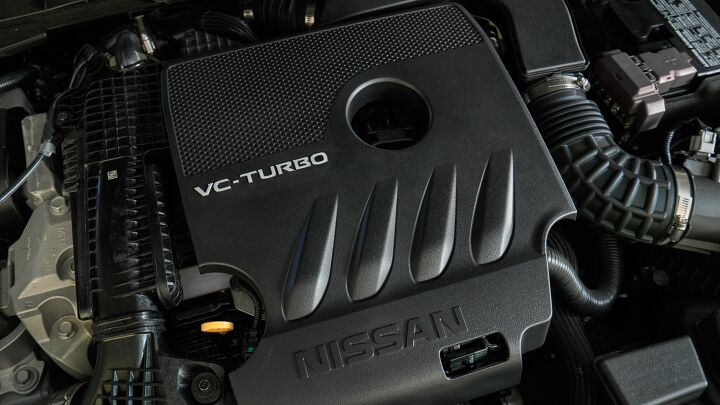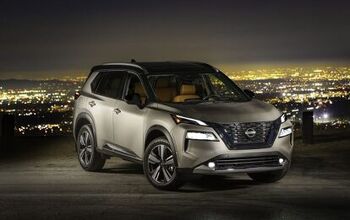The NHTSA is Investigating Nissan's Variable Compression Engine Problems

Nissan hailed its variable compression engines as great for performance and fuel economy, though the real-world benefits of the advanced mills haven’t completely lived up to the hype. They also appear to have issues that could cause a loss of power, knocking sounds, and engine failure in the most extreme cases, leading the National Highway Traffic Safety Administration to open an investigation.
The NHTSA is looking at more than 450,000 Nissan vehicles that use one of its two variable compression engines, including the Altima, Rogue, and Infiniti QX50. Owners have reported all sorts of issues with the 2.0-liter four-cylinder and 1.5-liter three-cylinder engines, but the automaker has not yet issued a recall to address the problems.
Variable compression technology allows the engines to shift their compression ratios to maximize fuel economy or power, depending on the situation. Despite those benefits, Nissan’s engines return only marginally better fuel economy, and the automaker remains the only company using the technology.
Though this is just an investigation at this point, the NHTSA could push for a recall if it determines that there is a defect. The complexity of the engines gives them their notable capabilities, but more complication isn’t always a good thing in mechanical systems. After all, there’s probably a good reason that other automakers haven’t followed Nissan down the variable compression path, and it’s likely because they’re expensive to develop and produce. Their complicated designs could have multiple possible failure points, which is less than desirable for a component that needs to run for tens of thousands of miles.
[Image: Nissan]
Become a TTAC insider. Get the latest news, features, TTAC takes, and everything else that gets to the truth about cars first by subscribing to our newsletter.

Chris grew up in, under, and around cars, but took the long way around to becoming an automotive writer. After a career in technology consulting and a trip through business school, Chris began writing about the automotive industry as a way to reconnect with his passion and get behind the wheel of a new car every week. He focuses on taking complex industry stories and making them digestible by any reader. Just don’t expect him to stay away from high-mileage Porsches.
More by Chris Teague
Latest Car Reviews
Read moreLatest Product Reviews
Read moreRecent Comments
- 28-Cars-Later Actually Honda seems to have a brilliant mid to long term strategy which I can sum up in one word: tariffs.-BEV sales wane in the US, however they will sell in Europe (and sales will probably increase in Canada depending on how their government proceeds). -The EU Politburo and Canada concluded a trade treaty in 2017, and as of 2024 99% of all tariffs have been eliminated.-Trump in 2018 threatened a 25% tariff on European imported cars in the US and such rhetoric would likely come again should there be an actual election. -By building in Canada, product can still be sold in the US tariff free though USMCA/NAFTA II but it should allow Honda tariff free access to European markets.-However if the product were built in Marysville it could end up subject to tit-for-tat tariff depending on which junta is running the US in 2025. -Profitability on BEV has already been a variable to put it mildly, but to take on a 25% tariff to all of your product effectively shuts you out of that market.
- Lou_BC Actuality a very reasonable question.
- Lou_BC Peak rocket esthetic in those taillights (last photo)
- Lou_BC A pickup for most people would be a safe used car bet. Hard use/ abuse is relatively easy to spot and most people do not come close to using their full capabilities.
- Lorenzo People don't want EVs, they want inexpensive vehicles. EVs are not that. To paraphrase the philosopher Yogi Berra: If people don't wanna buy 'em, how you gonna stop 'em?


































Comments
Join the conversation
"...but more complication isn’t always a good thing in mechanical systems."
"...but more complication is never, ever a good thing in mechanical systems, no exceptions."
FIFY
When I first saw a description of these engines I wondered how Nissan had made such a complex design reliable enough for mass production. Guess it turns out they didn’t. I am surprised the tech didn’t provide more efficiency benefits.